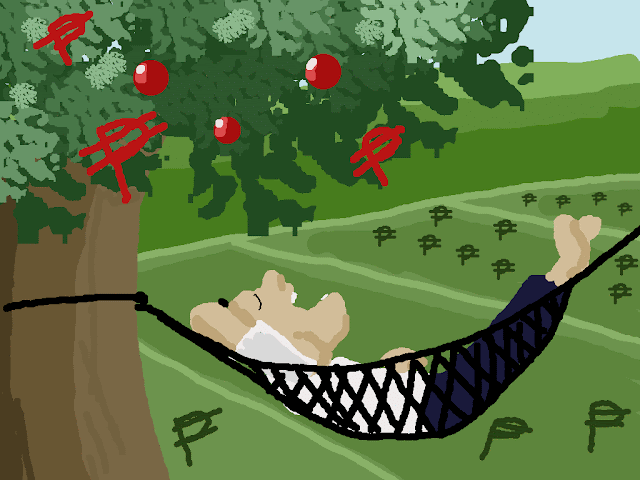I remembered how some crazy 4Ps-obsessed old man said that the policy he so loves is about making sure nobody gets left behind. Well, here's the problem -- a conditional cash transfer policy isn't meant to be given to people who refuse to comply with the requirements. It's also not the government's responsibility to directly provide for your basic needs. Sure, the government is obligated to uphold economic policies that will create jobs (such as removing excessive restrictions on foreign investors) but not to provide for your needs. You have to be the one to learn to provide for your needs.
Let's imagine a Philippines where the 60/40 is removed. One can say that even with 60/40 removed that the 37% of Filipinos will still be starving to death. But when will said Filipinos in the 37% bracket remain in their poverty? That is if they continue to indulge in habits that make one stay in poverty even in the midst of economic improvement. You can have more foreign investors to add more revenues in the form of income taxes. However, if this 37% of Filipinos would refuse to grab the opportunities of new job openings (even if it's menial jobs) then they would still stay in the poverty line. If they refuse to grab the opportunities to work then they would be forever be stuck in the same sector of the 37%.
The truth is it's one's choice to be left behind or not. The illustration is just like a calamity. Let's say that a typhoon is about to come in anytime soon and government officials gave an order to civilians in certain areas to vacate to the safety shelters. But if people refuse to vacate then can the government force these idiots to follow orders? The government can only warn about incoming calamity and provide calamity relief procedures (such as evacuation) but they can't force people to accept them. The same can go for economic policies -- either you take the opportunity or you leave it!
Let's imagine a Philippines where the 60/40 is removed. One can say that even with 60/40 removed that the 37% of Filipinos will still be starving to death. But when will said Filipinos in the 37% bracket remain in their poverty? That is if they continue to indulge in habits that make one stay in poverty even in the midst of economic improvement. You can have more foreign investors to add more revenues in the form of income taxes. However, if this 37% of Filipinos would refuse to grab the opportunities of new job openings (even if it's menial jobs) then they would still stay in the poverty line. If they refuse to grab the opportunities to work then they would be forever be stuck in the same sector of the 37%.
The truth is it's one's choice to be left behind or not. The illustration is just like a calamity. Let's say that a typhoon is about to come in anytime soon and government officials gave an order to civilians in certain areas to vacate to the safety shelters. But if people refuse to vacate then can the government force these idiots to follow orders? The government can only warn about incoming calamity and provide calamity relief procedures (such as evacuation) but they can't force people to accept them. The same can go for economic policies -- either you take the opportunity or you leave it!

Comments
Post a Comment